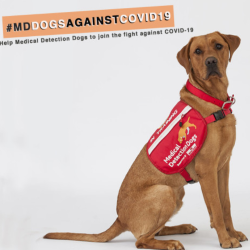I just learned an amazing fact in Pets Magazine, a wonderful publication! There are six furry children learning to detect the COVID-19 virus!
There is a charity called Medical Detection Dogs, the world leader in training dogs to detect the odor of human disease like cancer, Parkinson’s disease, malaria, and other bacterial infections. They are currently partnering with the London School of Hygiene and Tropical Medicine and Durham University in order to bring about the rapid training of dogs like the 6 above to provide a non-invasive diagnosis towards the end of the epidemic. Together they are launching a Crowfunder to start raising funds for their initial stages. They say it will take 6-8 months to train the dogs. If successful, these dogs could also be able to detect subtle changes in the temperature of the skin.
https://www.indiegogo.com/projects/md-dogs-against-covid19#/
The super six could be the first dogs to be used to identify travelers entering the country infected with the virus or be put on other tasks. Dr Claire Guest, CEO and Co-Founder of Medical Detection Dogs, says: “Our aim is that some of these amazing 6 dogs will be able to passively screen any individual, including those with no symptoms, and tell our dog handlers whether they have detected the virus. This will then need to be confirmed by a medical test.
“We will train them in the same way we train our other Bio Detection Dogs, in our training room, and then transfer them to detecting on individuals in a similar way to our Medical Alert Assistance Dogs.
“The samples that the dogs will be trained on at the centre will be deactivated (dead) virus and therefore of no risk to the dogs or handlers. When sniffing people the dogs will not need to make contact but will sniff the air around a person. The dogs will therefore not be in direct contact with the people screened to prevent the risk of spreading the virus.”





